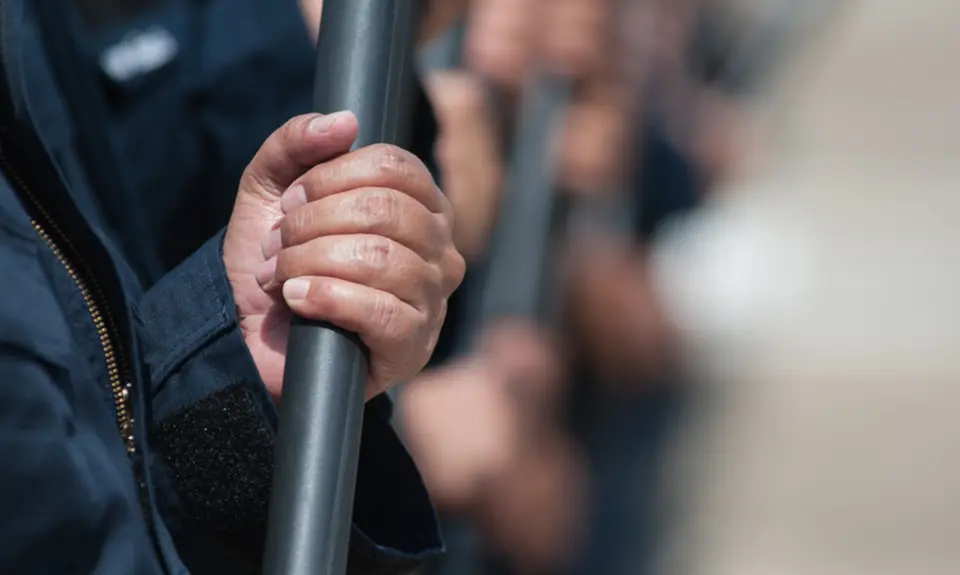“Confirmed Judges, Confirmed Fears” is a blog series documenting the harmful impact of President Trump’s judges on Americans’ rights and liberties.
Trump 4th Circuit judge Marvin Quattlebaum dissented in a 2-1 July ruling that declared unconstitutional a provision that the City of Baltimore used in most police abuse settlements that required survivors of police violence to refrain from discussing the case publicly on pain of losing half the settlement amount. The majority referred to the payment as “hush money” that violated the First Amendment. The case is Overbey v. Mayor & City Council of Baltimore.
When Ashley Ovebey, an African-American resident of Baltimore, called 911 to report a burglary, several Baltimore police officers responded instead by brutalizing her violently. She filed suit against the officers for having “beaten, tased, verbally abused, and needlessly arrested her in her own home.” The case proceeded for about two years, during which she and her children became homeless, ‘partly because Ovebey’s arrest record made it difficult for her to find work.” She then agreed with the City and the officers to settle the case for $63,000.
As with 95 percent of police misconduct settlements with Baltimore at that time, the agreement included a “non-disparagement clause” that prohibited Ovebey from speaking publicly about the case or the police officers’ misconduct. If she violated those restrictions – which did not similarly apply to the City – she would forfeit half the settlement amount back to the City.
The Baltimore Sun ran a brief story about the case and its settlement based mainly on public information, but also quoted a City official characterizing Ovebey as “hostile” toward the police, “insinuating that Overbey, not the officers, had been at fault.” The story led to a number of racist online comments suggesting that she had initiated a confrontation in the hope of getting a “payout” from the City. Overbey posted several responses online explaining that the police had been at fault and describing some of her injuries.
The City decided that Ovebey’s comments violated the non-disparagement clause. Since the settlement had not yet been paid, it withheld half the amount and paid her only $31,500.
Overbey then filed suit against Baltimore, seeking the full settlement amount and contending that the City’s withholding violated the First Amendment. News organizations in Baltimore and elsewhere supported her case. But the district court granted summary judgment for the city, finding that Overbey had waived her First Amendment right to speak by signing the settlement agreement.
A three-judge panel of the 4th Circuit reversed in a 2-1 decision. Under well-established precedent, the majority explained, a waiver of a constitutional right can be enforced only if the “interest” in enforcing it is “not outweighed by a relevant public policy that would be harmed by enforcement.” The majority wrote that “[c]laims of police misconduct” and how Baltimore deals with them are clearly “public issues” as to which the public has a “well-established” First Amendment interest in “uninhibited, robust, and wide-open” discussion and debate. The non-disparagement clause, the majority went on, is a “government-defined and government-enforced restriction on government-critical speech.” The majority thus determined that enforcement of the clause is clearly “contrary to the citizenry’s First Amendment interest in limiting the government’s ability to target and remove speech critical of the government from the public discourse.”
In dissent, Quattlebaum argued, as did the City, that Baltimore’s interest in enforcing its settlement “contract” with Overbey outweighed the First Amendment harms. The majority explained, however, that the City’s “general interests” in settling litigation and enforcing contracts is “not enough” to make the waiver of constitutional rights enforceable under the law, and similarly rejected the assertion that it would be “unfair” to allow Overbey to receive the portion of the settlement amount that the City claims was “earmarked for her silence.” As the majority made clear, the courts have “never ratified the government’s purchase of a potential critic’s silence merely because it would be unfair to deprive the government of the full value of its hush money.”
Overall, the majority concluded, enforcement of the clause “cuts against strong public interests that are highly relevant to the very rights that Overbey waived.” On the other hand, there was “no comparably compelling public good or other legitimate government aim” that would be furthered by enforcement of the clause.
Although Quattlebaum’s position would have clearly harmed the important interests at stake, his view did not prevail. The majority opinion noted that Baltimore has recently abandoned its “hush money” practice. The majority’s decision will help ensure that other cities and authorities avoid such unconstitutional provisions, which only serve to suppress police violence survivors’ voices. Especially when the majority of survivors of police violence are people of color, the First Amendment right to speak freely about any matter, including police violence or any other government misdeed, must be protected in our courts.
